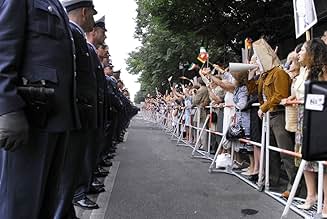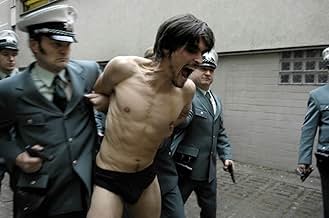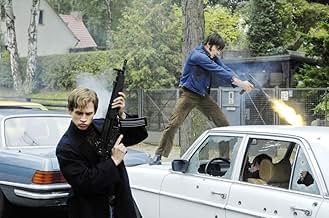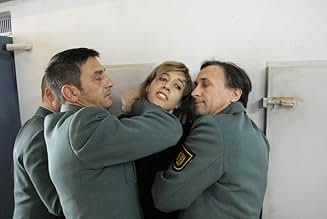AVALIAÇÃO DA IMDb
7,3/10
41 mil
SUA AVALIAÇÃO
Uma olhada no grupo terrorista alemão, The Red Army Faction, que organizou bombardeios, roubos, sequestros e assassinatos no final dos anos 1960 e 1970.Uma olhada no grupo terrorista alemão, The Red Army Faction, que organizou bombardeios, roubos, sequestros e assassinatos no final dos anos 1960 e 1970.Uma olhada no grupo terrorista alemão, The Red Army Faction, que organizou bombardeios, roubos, sequestros e assassinatos no final dos anos 1960 e 1970.
- Direção
- Roteiristas
- Artistas
- Indicado a 1 Oscar
- 4 vitórias e 22 indicações no total
Niels-Bruno Schmidt
- Jan Carl Raspe
- (as Niels Bruno Schmidt)
Hans Werner Meyer
- Klaus-Rainer Röhl
- (as Hans-Werner Meyer)
- Direção
- Roteiristas
- Elenco e equipe completos
- Produção, bilheteria e muito mais no IMDbPro
Avaliações em destaque
I wish to clear up any mistake my summary for this might lead to: This is not poorly done. As for this being good or not, that is perhaps a little more subjective, as it may depend on your opinion of the RAF. This is another of the German films of recent years dealing with awful national situations of theirs, from a couple, to numerous, decades back. Whether it's therapeutic, apologetic, a third option or a mix of several that drives this trend, is up for debate. I find this and Der Untergang(or "Downfall") to be exceptionally well-done. As was also the case with that one, this requires you to pay close attention. The pace comes about as close to being outright overpowering - for two and a half hours straight, mind you - as it can, without crossing the line into it. This does also somewhat expect you to be familiar with the overall occurrences, otherwise, you may be confused and have trouble keeping track and following it. This is rather intense. It is a quite strong piece. Featured is an immense amount of violence, which is often graphic. The attitude towards nudity and sexuality is very relaxed. This is disturbing. It is by no means for the faint of heart, and mainstream audiences, if they give this a chance, should not expect it to be "enjoyable", in the traditional sense. It is not "funny". It is powerful. The cinematography and editing are excellent. The acting performances are beyond reproach. I don't know all the facts, but I understand that this isn't completely historically accurate, though it seems to come fairly close. The production values are incredible. I recommend this to anyone interested in an authentic drama based on the Rote Armee Fraktion. 8/10
I watched the movie at a teacher's screening in Wuppertal on a Sunday morning. I was quite impressed with the accurate and detailed portrayal of the RAF and the events of the so called 'German fall' (Deutscher Herbst). I myself knew of many of the events beforehand and thanks to documentaries such as Veiel's Black Box BRD and Breloer's Todesspiel I was able to compare. For the two and some hours that the movie lasted I was on the edge of my seat. None of the scenes were boring, everything was well paced (at times maybe a little too fast paced) and I felt like I was being taken back to the important past of my native country. However, at the end I felt a little empty. The documentaries I just mentioned focused on only one story, but these documentaries were better because they gave us an in-depth analysis of the opposing forces (the bourgeoisie, the elite and the socialist rebels).
The portrayal of Meinhof and Baader seems accurate, too, but often I wondered if Baader really was the small-time crook he's made out to be in the movie. Except for Meinhof and Ensslin nobody seems to have some really deep thoughts about what was (is) wrong with our society. Mohnhaupt played by Nadja Uhl isn't explained at all, she's just there all of a sudden and we just go along thinking that she is in it for the same reasons as everybody else (Which are???).That way the movie seemed a little biased, as if trying to tell us that the RAF was mainly criminal and not so much political. Although I believe that a lot of their motives were right, even though they didn't justify any of the actions.
Bruno Ganz as Herold is allowed to play his character in a way that everyone thinks of the German government at the time as a dignified and moderate administration although I don't believe that to be true (after all, Herold said that he can only cure the symptoms of the RAF disease but not the disease itself, yet he didn't do anything to make the German people understand that the RAF is not altogether wrong when it accuses the German people of laziness, cowardice and complacency).
Now, leaving the movie, I figured that there was nothing much left to talk about. The teacher material that we received was pretty useless, because it doesn't offer any interesting topics for discussion. I for one think it would be interesting to discuss the present situation (bureaucracy, war in Iraq, terrorism) with the situation of Germany in the 70's. We are still dealing with many of the problems that caused the insurgency and civil disobedience back then, yet today we don't do anything at all. We are dissatisfied with the Bush administration, we oppose the war in Iraq and Afghanistan, we suffer from a financial crisis mainly caused by the deregulated free market economy (capitalism) and we watch the divide between the rich and the poor getting bigger and bigger.
However, the youth of today doesn't protest. Why not? Maybe because we taught them well that in the end it's everyone for themselves and that it's best to be obedient, docile and commonorgarden if you want at least a little security in your life. One of the stronger scenes was the one where Ensslin accuses Meinhof of jerking off on her socialist theories instead of actually doing something. That's where you can see how Meinhof was influenced by the RAF. Finally she met some people who were willing to take action instead of just talking and philosophizing about a better world. This scene lends itself well to the follow-up scene in which Meinhof helps Baader to escape from prison. The jump from the window sill is a the same time a jump towards extremism.
Well, all in all, I think it's a good film to get people interested in Germany's past but it can only be the beginning of a more subtle analysis of what the RAF stood for and what it was trying to do.
The portrayal of Meinhof and Baader seems accurate, too, but often I wondered if Baader really was the small-time crook he's made out to be in the movie. Except for Meinhof and Ensslin nobody seems to have some really deep thoughts about what was (is) wrong with our society. Mohnhaupt played by Nadja Uhl isn't explained at all, she's just there all of a sudden and we just go along thinking that she is in it for the same reasons as everybody else (Which are???).That way the movie seemed a little biased, as if trying to tell us that the RAF was mainly criminal and not so much political. Although I believe that a lot of their motives were right, even though they didn't justify any of the actions.
Bruno Ganz as Herold is allowed to play his character in a way that everyone thinks of the German government at the time as a dignified and moderate administration although I don't believe that to be true (after all, Herold said that he can only cure the symptoms of the RAF disease but not the disease itself, yet he didn't do anything to make the German people understand that the RAF is not altogether wrong when it accuses the German people of laziness, cowardice and complacency).
Now, leaving the movie, I figured that there was nothing much left to talk about. The teacher material that we received was pretty useless, because it doesn't offer any interesting topics for discussion. I for one think it would be interesting to discuss the present situation (bureaucracy, war in Iraq, terrorism) with the situation of Germany in the 70's. We are still dealing with many of the problems that caused the insurgency and civil disobedience back then, yet today we don't do anything at all. We are dissatisfied with the Bush administration, we oppose the war in Iraq and Afghanistan, we suffer from a financial crisis mainly caused by the deregulated free market economy (capitalism) and we watch the divide between the rich and the poor getting bigger and bigger.
However, the youth of today doesn't protest. Why not? Maybe because we taught them well that in the end it's everyone for themselves and that it's best to be obedient, docile and commonorgarden if you want at least a little security in your life. One of the stronger scenes was the one where Ensslin accuses Meinhof of jerking off on her socialist theories instead of actually doing something. That's where you can see how Meinhof was influenced by the RAF. Finally she met some people who were willing to take action instead of just talking and philosophizing about a better world. This scene lends itself well to the follow-up scene in which Meinhof helps Baader to escape from prison. The jump from the window sill is a the same time a jump towards extremism.
Well, all in all, I think it's a good film to get people interested in Germany's past but it can only be the beginning of a more subtle analysis of what the RAF stood for and what it was trying to do.
First of all this is a very important film. Just like the other "Big" film by Eichinger "Der Untergang" it confronts the German audience (and the world should it care) with some aspect of German history that people should know about. In this case the "myth" of the RAF. To everyone who lived through the seventies in Germany it is clear that the influence of the RAF on Germany can hardly be exaggerated. I was a kid but my impression at the time was that both sides were wrong. There was a constant fear of terror coming from the terrorists but also from the state. (People did not get jobs if it was suspected they were "left".) So to make a blockbuster film, even if it does not really explain the motives of the main characters involved, at least gives us some facts. Not everyone is prepared to watch documentaries or read the book by Aust, but everyone should have some thoughts or maybe discussions on the subject.
Okay, but does it succeed as a film? Not entirely. The actors as everyone agrees were excellent, the cinematography as well. You do think you are in the seventies. That in itself is amazing. The action scenes are done splendidly, especially at the beginning the riots during the visit of the Persian Shah which culminated in the shooting of a student which in turn was, at least to some extent, the origin of the rise of terror. Of course the film is episodic and there are too many characters in it, most of them are not introduced in any way and ten years of complex history cannot be told in an altogether satisfying way. But the film succeeds in giving us a sense of what was going on. The producer, Bernd Eichinger has been accused of vanity. Which is a funny thing. Of course, he is vain. He has the duty to be vain as long as he also feels a responsibility to make movies that try to tell something. And the challenge, he feels, is to say it to as many people as possible.
Okay, but does it succeed as a film? Not entirely. The actors as everyone agrees were excellent, the cinematography as well. You do think you are in the seventies. That in itself is amazing. The action scenes are done splendidly, especially at the beginning the riots during the visit of the Persian Shah which culminated in the shooting of a student which in turn was, at least to some extent, the origin of the rise of terror. Of course the film is episodic and there are too many characters in it, most of them are not introduced in any way and ten years of complex history cannot be told in an altogether satisfying way. But the film succeeds in giving us a sense of what was going on. The producer, Bernd Eichinger has been accused of vanity. Which is a funny thing. Of course, he is vain. He has the duty to be vain as long as he also feels a responsibility to make movies that try to tell something. And the challenge, he feels, is to say it to as many people as possible.
I agree with the other comments on the following points: the film does indeed concentrate on the culprits and their actions in a documentary way (as opposed to an interpretation of the RAF's ideas and motivations from a clear-cut political standpoint). Although the victims DO appear they are not characterized more closely; the only representative of the state is Horst Herold (head of the BKA), politicians do not show up at all, the media appear only in the shape of Springer, konkret and Spiegel and even the lawyers (Haag, Croissant, Schily, Ströbele, etc.) are merged into only one (fictitious?) character. I for one do agree with this approach and if you are prepared for it you probably can live with it too. In any case, despite all the chases, shootouts and explosions it hasn't become a mere action-film.
What's more problematic is that the film follows the book by Stefan Aust VERY closely. Therefore the dramaturgy is more similar to "real life" than to a classical feature film (e.g. there are many changes in pace, several climaxes are distributed over the course of the film and a proper arc of suspense is somewhat missing). "Fortunately" real life offered a culmination of events with the Schleyer kidnapping in the "German Autumn" 1977, so that the film ends in a reasonably satisfying way. Nevertheless the end credits come a little abruptly.
The second problem is that the film tries to show virtually ALL events from the book (only some minor incidents like the Mahler detention, Peter Urbach, the burglaries in registration offices in order to steal blank passports or the visit of Jean-Paul Sartre in Stammheim are missing) so that it needs to squeeze 10 years of history into 140 minutes. The result is a film with breakneck speed at some points. The better scenes (e.g. the training camp in Jordan or the lawsuit in Stammheim) are obviously those where the film catches breath, calms down and takes its time for the actors to shine.
The quality of the acting ranges from good to fantastic (with very few exceptions like Alexandra Maria Lara, who is nothing more than wide-eyed again and who thankfully doesn't even have dialogue). Especially Martina Gedeck and Johanna Wokalek are sensational. It is THEIR film and the conflicts in Stammheim which led to Meinhof's suicide are acted Oscar-worthy. But Michael Gwisdek (Ensslin's father), Jan Josef Liefers (Peter Homann), Sebastian Blomberg (Rudi Dutschke), Nadja Uhl (Brigitte Mohnhaupt) and Hannah Herzsprung (Susanne Albrecht) are also very good.
The production values are excellent too. A lot of locations, a great deal of main and supporting roles, hundreds of extras, good special effects (mainly explosions) and a set design and costume design which creates a very coherent 70's atmosphere: you can see that the film cost a lot of money. Every cent is on the screen.
I didn't like the choice of music that much. Deep Purple's "Child in Time" is always great to hear, but the rest (Janis Joplin, The Who, Bob Dylan) is just too mainstreamy and unimaginative for my taste (but probably also very expensive). Why not use MC5, Ton Steine Scherben or Ennio Morricone's "Vamos a matar, companeros"?
Now I'm looking forward to the reactions and reviews from other countries, who probably don't know this part of German history very well. In the US I expect the criticism that there are too many naked people, too many swear words and even more cigarettes (every one in BMK smokes everywhere and at all times), in order to distract from the politics of the film ;-) "Der Baader Meinhof Komplex" isn't the masterpiece on the history of the first generation of the RAF that I had hoped for in my comments on "Todesspiel", but altogether it is a very suspenseful, fascinating, densely narrated and well acted film. Hopefully it will not be the last word on the subject, but it succeeds in giving the audience the basic RAF knowledge on which future (less neutral, more opinionated) movies can build their stories.
What's more problematic is that the film follows the book by Stefan Aust VERY closely. Therefore the dramaturgy is more similar to "real life" than to a classical feature film (e.g. there are many changes in pace, several climaxes are distributed over the course of the film and a proper arc of suspense is somewhat missing). "Fortunately" real life offered a culmination of events with the Schleyer kidnapping in the "German Autumn" 1977, so that the film ends in a reasonably satisfying way. Nevertheless the end credits come a little abruptly.
The second problem is that the film tries to show virtually ALL events from the book (only some minor incidents like the Mahler detention, Peter Urbach, the burglaries in registration offices in order to steal blank passports or the visit of Jean-Paul Sartre in Stammheim are missing) so that it needs to squeeze 10 years of history into 140 minutes. The result is a film with breakneck speed at some points. The better scenes (e.g. the training camp in Jordan or the lawsuit in Stammheim) are obviously those where the film catches breath, calms down and takes its time for the actors to shine.
The quality of the acting ranges from good to fantastic (with very few exceptions like Alexandra Maria Lara, who is nothing more than wide-eyed again and who thankfully doesn't even have dialogue). Especially Martina Gedeck and Johanna Wokalek are sensational. It is THEIR film and the conflicts in Stammheim which led to Meinhof's suicide are acted Oscar-worthy. But Michael Gwisdek (Ensslin's father), Jan Josef Liefers (Peter Homann), Sebastian Blomberg (Rudi Dutschke), Nadja Uhl (Brigitte Mohnhaupt) and Hannah Herzsprung (Susanne Albrecht) are also very good.
The production values are excellent too. A lot of locations, a great deal of main and supporting roles, hundreds of extras, good special effects (mainly explosions) and a set design and costume design which creates a very coherent 70's atmosphere: you can see that the film cost a lot of money. Every cent is on the screen.
I didn't like the choice of music that much. Deep Purple's "Child in Time" is always great to hear, but the rest (Janis Joplin, The Who, Bob Dylan) is just too mainstreamy and unimaginative for my taste (but probably also very expensive). Why not use MC5, Ton Steine Scherben or Ennio Morricone's "Vamos a matar, companeros"?
Now I'm looking forward to the reactions and reviews from other countries, who probably don't know this part of German history very well. In the US I expect the criticism that there are too many naked people, too many swear words and even more cigarettes (every one in BMK smokes everywhere and at all times), in order to distract from the politics of the film ;-) "Der Baader Meinhof Komplex" isn't the masterpiece on the history of the first generation of the RAF that I had hoped for in my comments on "Todesspiel", but altogether it is a very suspenseful, fascinating, densely narrated and well acted film. Hopefully it will not be the last word on the subject, but it succeeds in giving the audience the basic RAF knowledge on which future (less neutral, more opinionated) movies can build their stories.
The movie of Edel and Eichinger is fine when it comes to sets and costumes. It seems to catch the mood of the late Sixties and Seventies very well. Also the lead actors Bleibtreu, Wokalek and Gedeck have delivered outstanding performances. Too bad, that they don't get a chance to really explore their characters: Too much else is going on in this movie, that completely loses its focus during the last hour. The closer we get to the end, the more it resembles a documentary with a few scenes of play cut in now and then.
The viewer is presented with a lot of facts - and violence - but the movie fails in decoding the often cited "myth" of the RAF. For example, I've always wondered, whether Baader was just a criminal or really politically motivated. Well, in the first half of the movie, Baader is portrayed as an outlaw, who enjoys provocation and fast cars. Later he delivers sophisticated political statements. A good movie should at least try to explain this development. DER BAADER MEINHOF KOMPLEX doesn't.
The viewer is presented with a lot of facts - and violence - but the movie fails in decoding the often cited "myth" of the RAF. For example, I've always wondered, whether Baader was just a criminal or really politically motivated. Well, in the first half of the movie, Baader is portrayed as an outlaw, who enjoys provocation and fast cars. Later he delivers sophisticated political statements. A good movie should at least try to explain this development. DER BAADER MEINHOF KOMPLEX doesn't.
Você sabia?
- CuriosidadesAs an immediate reaction to the movie, Ignes Ponto, widow of Jürgen Ponto, whose assassination is portrayed in the movie, returned her Federal Cross of Merit. She was angry that the Federal Republic of Germany has never even created a memorial for victims of the RAF, but instead helped to finance films like this one about the members of the RAF. Also, she said, she had not been warned about the graphic portrayal of Ponto's assassination when she was invited to the movie premiere and felt humiliated by the producers for making her sit through this without a warning. About a month later, she filed a lawsuit against the producers, who claimed that every scene is historically accurate, because the assassination of her husband, which she had to witness from the next room, was not portrayed as it happened. She demands the scene of the murder of her husband be cut from the movie. The filmmakers claim that they had tried to contact her during production to get the scene right but she had no desire to cooperate. Before this movie, there had been no portrayal of Ponto's assassination on film and she felt the staging of the movie was lurid and dishonoring to her husband. As of this writing, no decision has been reached about the lawsuit.
- Erros de gravaçãoUlrike Meinhof's twin daughters Bettina and Regine first appear in the opening scene in 1967 when they are 9 years old. Yet 3 years later when living in Sicily and rescued by Stefan Aust, they haven't aged at all.
- Citações
Ulrike Meinhof: If you throw a stone, it's a crime. If a thousand stones are thrown, that's political. If you set fire to a car it's a crime; if a hundred cars are set on fire that's political.
- ConexõesFeatured in Guinness World Records - Die größten Weltrekorde: Episode #5.1 (2008)
- Trilhas sonorasMercedes Benz
Written by Janis Joplin, Michael McClure
Performed by Janis Joplin
Produced by Paul A. Rothchild
Principais escolhas
Faça login para avaliar e ver a lista de recomendações personalizadas
Detalhes
- Data de lançamento
- Países de origem
- Central de atendimento oficial
- Idiomas
- Também conhecido como
- The Baader Meinhof Complex
- Locações de filme
- Empresas de produção
- Consulte mais créditos da empresa na IMDbPro
Bilheteria
- Orçamento
- € 20.000.000 (estimativa)
- Faturamento bruto nos EUA e Canadá
- US$ 476.270
- Fim de semana de estreia nos EUA e Canadá
- US$ 17.348
- 23 de ago. de 2009
- Faturamento bruto mundial
- US$ 26.937.355
- Tempo de duração2 horas 30 minutos
- Cor
- Mixagem de som
- Proporção
- 1.85 : 1
Contribua para esta página
Sugerir uma alteração ou adicionar conteúdo ausente

Principal brecha
By what name was O Grupo Baader Meinhof (2008) officially released in India in Hindi?
Responda




































